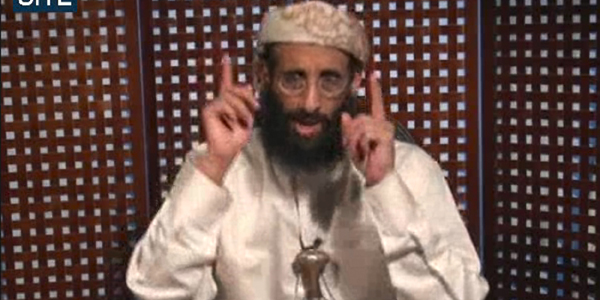Anwar Who?
Killed today in Yemen, American terrorist Anwar al-Awlaki's greatest accomplishment was also the thing that killed him: convincing the U.S. that he mattered
The hype surrounding U.S. citizen Anwar al-Awlaki, hiding in Yemen and assisting the al-Qaeda branch there, gets louder as you approach Washington, DC, the city he dreamed of attacking but never did. He was "more dangerous even than Osama bin Laden had been," according to Rep. Peter King. Then-chair of the House Homeland Security Subcommittee on intelligence, Rep. Jane Harman, called him, "probably the person, the terrorist, who would be terrorist number one in terms of threat against us." The White House has been quieter in words -- counterterrorism chief John Brennan described him as "a problem" -- but not in deed: they placed him on a controversial "kill list" of about three Americans (Awlaki's name is the only one publicly known) approved for killing without due process.
But Awlaki is far less known where it really matters: in the Arab world, where he would putatively have been finding recruits. Even in his home country of Yemen, he is an obscure figure. The New York Times' Laura Kasinof tweeted that the Yemenis "at pro and anti-gov't demonstrations don't seem to care about Anwar al-Awlaqi." Another journalist in Sana'a, Tom Finn, said that many locals he spoke to didn't even know who Awlaki was. "Who is that, a journalist?" Yemen-based reporter Adam Baron was asked when he told his Arabic teacher he would be missing class to write about Awlaki's death. Jeb Boone, noting that the Awlaki name is not a rare one in Yemen, noted a common response when Yemenis are asked about the terrorist: "Awlaki? Yeah, they selling refrigerators."
It seems that there is an Awlaki in Yemen who runs a refrigerator shop, and that Yemenis may care more about this man and his fridges than about the New Mexico-born cleric who made it near the top of America's most wanted list.
What threat did Awlaki really pose to the U.S.? In death, as in life, probably not much. Though the Yemen-based branch of al-Qaeda (known as al-Qaeda in the Arabian Peninsula, or AQAP) has been tied to recent attempted terrorist attacks the U.S., those attacks have all failed. And even those failures might have had little to do with Awlaki, a man with no operational experience, battlefield experience, or skillset known to extend beyond shouting into a webcam and posting to YouTube.
Whether or not those web-based pronouncements change anything is still up for debate. If they do, the impact was -- and will remain -- limited to web-surfing Westerners. "His many works will not die with him so his impact on the Western jihadi movement will not wane," Brandeis University researcher Aaron Zelin wrote in an email. "He is an enigmatic figure, which is why I believe so many struggle to fully comprehend his true stature (either influential or non-influential)."
Assuming that AQAP does pose a threat, that threat comes from experienced officers like AQAP emir Nasir al-Wihayshi, top military officer Qasim al-Raymi, and top AQAP ideological officer Ibrahim bin Sulayman al-Rubaysh. Battle-hardened or at least better known among the fields of potential Arab recruits, all three are still alive. As straight-talking Bush-era Homeland Security Advisor Frances Townsend confirmed this morning on CNN, Awlaki was not believed to have run either AQAP or its operations.
There is, however, an appropriate irony to the U.S. so heavily pursuing Awlaki, a man whose actual importance never appeared to come close to either his ego or his image in the U.S. Al-Qaeda these days is better at hype than at anything else; at taking credit beyond its actions and projecting its name beyond its actual reach. No one exemplified that better than Awlaki. He blustered, he threatened, he issued declarations and warnings. In the end, he convinced few fellow Arabs to listen; even his colleagues in Yemen's al-Qaeda branch never gave him a very prominent role. But he did manage to convince the U.S. government of his importance -- how we may never know, as the U.S. declared its evidence against Awlaki secret -- and it cost him his life.
